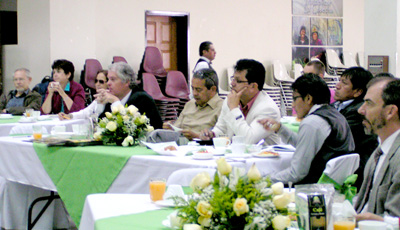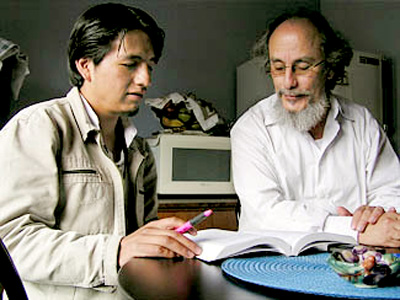MENU
 |
| Representatives of missionary-sending organizations in Quito meet to brainstorm ways of improving communication and bolstering support for Latin American missionaries. |
Now think of a missionary whose church and sending organization never communicate. What kind of support does the missionary receive?
The analogy isn't perfect, but you get the point. Good communication and trust are essential. That's why 30 leaders of missionary-sending churches and organizations in Ecuador accepted an invitation from Corrientes to meet together on Tuesday, Aug. 27. Following breakfast and a morning of discussion and presentations, they began to develop a more unified approach to sending and supporting cross-cultural missionaries from Latin America.
Corrientes is HCJB Global's missionary mentoring program. Since its creation in 2009, in addition to providing training for potential missionaries, a key area of focus has been tackling what the program's director, Carlos Pinto, calls a "lack of healthy dialogue between missionary-sending churches and missionary-sending organizations here in Latin America." Recognizing this "weakness in the Latin American missionary movement," his desire is that the program would be "used by God as a catalyst for change."
 |
| Carlos Pinto (right), director of Corrientes, HCJB Global's bi-vocational program to help prepare Latin American missionaries, mentors a student in the program. |
Attendees recognized that a lack of communication and trust among them was resulting in misunderstandings. Moreover, this was having a detrimental impact on the Latin American missionaries they were sending out.
Mike Frith, director of OSCAR, a U.K.-based mission information service, explains how a "missionary's support network consists of a diverse and complex group of organizations, churches and individual supporters…. In this complex situation with no one in overall responsibility, pastoral issues that missionaries face often fall through the cracks, and they don't get the care they really need."
Keen to improve support for Latin American missionaries, by the end of the morning the leaders had drawn up a declaration of intentions. These included a desire to improve mutual communication and develop a more collaborative approach to mobilizing, training, sending and caring for missionaries. They also emphasized the need to clarify the roles of sending churches and missionary-sending organizations.
The work doesn't stop there. The leaders have asked Corrientes to continue to facilitate dialogue and collaboration among them. The next meeting for missionary "senders" is set for Tuesday, Nov. 12.
The underlying motive, shared Pinto, is to "work towards carrying out Christ's Great Commission with cooperation and in unity so that the world will believe that God sent Jesus."
Sources: HCJB Global, OSCAR
